Boats: Call for rules to stop old vessels being dumped
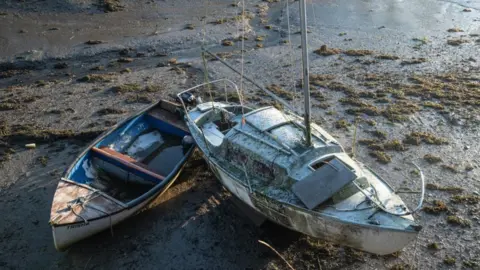 Ray Hobbs
Ray Hobbs"Put it on eBay, ask for anything from £1 to £100, then it becomes someone else's problem."
This was a typical response when marine biologist Dr Corina Ciocan asked: "How do you get rid of an old boat?"
There are estimated to be about one million of all types in the UK, including kayaks, with it costing more than £3,000 to scrap larger vessels.
It has led to warnings of a "tidal wave of abandonments", which could devastate marine life.
Natural Resources Wales (NRW) said a lack of end-of-life regulation and disposal costs can lead to boats being dumped, and it was looking at ways to tackle the problem.
The Department for Environment, Food and Rural Affairs (Defra) said it would be working with other countries to map the scale of the issue and develop guidance to improve the problem.
Dr Ciocan found "huge quantities" of tiny fibreglass shards used to make boats in oysters and mussels, and warned of potential dangers to sea life as well as humans.
She likened them to asbestos, adding: "It took Sir David Attenborough 10 years to make us aware of plastic pollution. Unless a big name does the same on this, not much can be done."
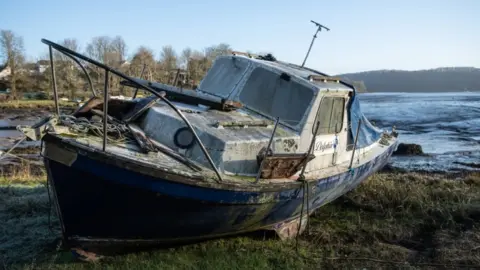 Ray Hobbs
Ray Hobbs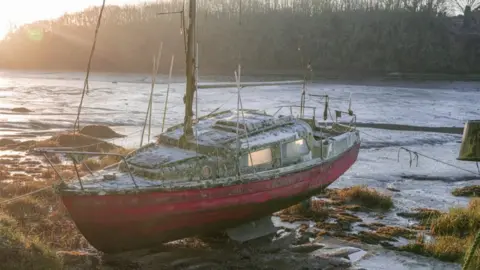 Ray Hobbs
Ray HobbsDr Ciocan, of Brighton University, described the fibres as "like spikes" that embed themselves into the organism and cannot be removed, saying a small snail looked like "a pin cushion" having been pierced many times.
She warned of owners taking boats out to sea, drilling holes and letting them sink, if disposal routes are not created through legislation.
Paddleboards and surfboards containing fibreglass are also currently unrecyclable and could pose a danger to marine life if dumped.
Dr Ciocan published research on the impact at Chichester Harbour, off the coast of West Sussex and Hampshire, where boats were being repaired and crushed, adding: "It caused an earthquake, with messages from people around the world saying it's a huge problem everywhere."
She said dismantling boats was effectively "a very complicated process", meaning there were few options for owners.
It often involves getting rid of oils, chemicals and plastics, before you even get to the hull - layers of polyester resin that can be mixed with balsa wood and foam.
 Ray Hobbs
Ray Hobbs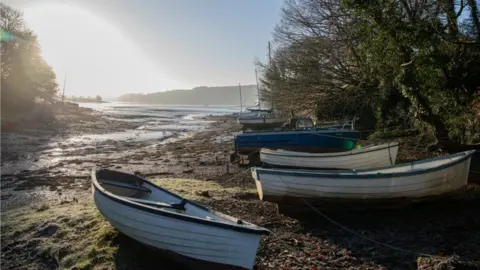 Ray Hobbs
Ray Hobbs"It needs to be incentivised, for boat owners to dispose of them in an environmentally-friendly way," she said.
"Usually, the older the boat, the poorer the owner. They won't have much money to spend on scientifically-proven disposal methods."
Ray Hobbs, from Burry Port, Carmarthenshire, always considered them a valuable commodity of the well-off, until he stumbled across what appeared to be a "ship graveyard" when walking his dog.
They were around the Cleddau Estuary near Llangwm, Pembrokeshire, with it unclear how long many had been there and when, if ever, the owners would return for some of them.
As a photographer, he was struck by the effects of the early morning sun and overnight frost on the vessels, but wondered: "What will become of all these boats?
"Will they be reclaimed and made seaworthy again by their owners, or rescued by a benevolent pirate and retuned to sea? Or forever languish in the salty mud banks until the end of time?"
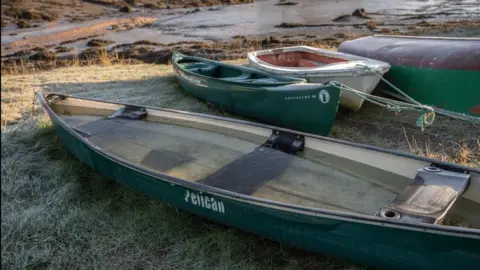 Ray Hobbs
Ray HobbsLuke Edney of Boatbreakers, one of the UK's few disposal firms, believes there could be "tidal wave of abandonments" in the next 15 years.
"There are too many boats and not enough people, and they are unrecyclable at the moment," he said.
End-of life-vehicle regulations mean people may get £50 for scrapping a car - but Mr Edney said getting rid of a boat will cost about £100-per-foot, meaning £3,000 for a 30ft (9m) vessel.
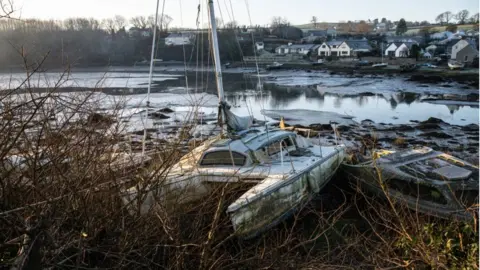 Ray Hobbs
Ray Hobbs Ray Hobbs
Ray HobbsHe said they become "a hot potato" and if a local authority takes ownership to scrap, they must foot the bill, with them being "a headache in any harbour space".
"The longer the local authority leaves them, the worse the condition and cost to get up. It's a catch 22," he added.
"It's a big headache - if someone can sell the boat cheap, they will pass it on. But if they got the boat for £1, it has no perceived value so they could dump when they're bored of it."
The £5,000-a-year fee to leave a 25ft (7.5m) yacht in some harbours is also a cost some people are reluctant to pay for an ageing boat.
"Covid accelerated the situation because people haven't been able to get to some for two years, so they were finding engines wouldn't start and other issues," Mr Edney added.
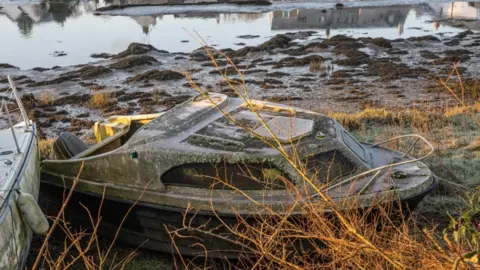 Ray Hobbs
Ray Hobbs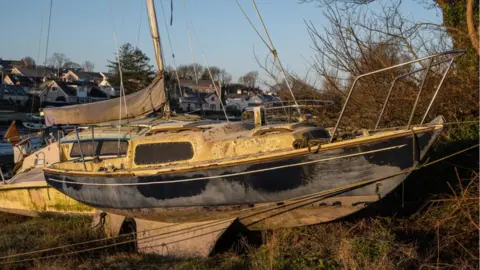 Ray Hobbs
Ray HobbsWhile those on canals are regulated, he described it as a "free for all" on the coast, suggesting a tax every time a boat is bought or sold as a possible solution to fund recycling.
Boatbreakers has more than 30,000 Facebook followers who it sells parts to, but only "scratches the surface" on what needs to be dealt with.
Truro Harbour Authority in Cornwall spent £75,000 disposing of an old fishing boat and £50,000 getting rid of another.
In Pembrokeshire, the local authority said it had no involvement in dealing with boats, while in Llangwm, councillors were unsure about ownership of those left in the area.
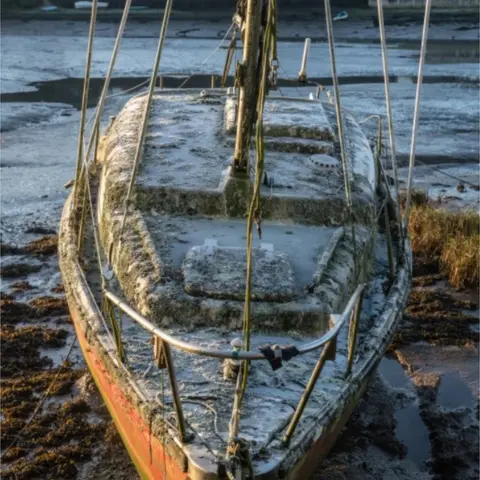 Ray Hobbs
Ray Hobbs
"Current laws state that the responsibility for disposing of end-of-life boats lies with the local authority or the harbour authority only where there is a navigational issue," said NRW's senior marine advisor Rowland Sharp.
"NRW are currently working on a number of projects to progress how we deal with end-of-life boats in Wales, including a project assessing the situation in Milford Haven, and a cross-border project with Natural England at the Dee."
It is also developing a best practice protocol for how we deal with end-of-life boats, specifically those potentially affecting Marine Protected Areas.
Defra said the UK was leading action under the new Regional Action Plan on Marine Litter to tackle end-of-life vessels.
"Working together with other countries, we will map the scale of the issue across the region and develop guidance to improve waste management for recreational vessels that are no longer wanted or fit for use," a spokesperson said.
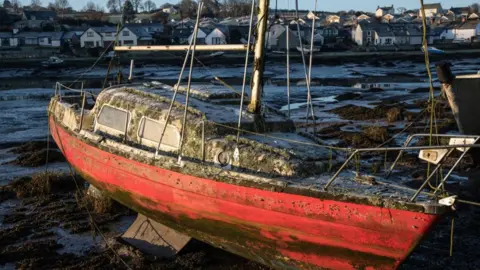 Ray Hobbs
Ray Hobbs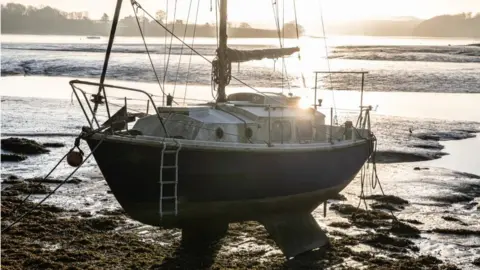 Ray Hobbs
Ray Hobbs
- SAM SMITH PRESENTS STORIES OF HIV: From Terrence Higgins to today
- BORN DEAF, RAISED HEARING: What it means to live in two different worlds

